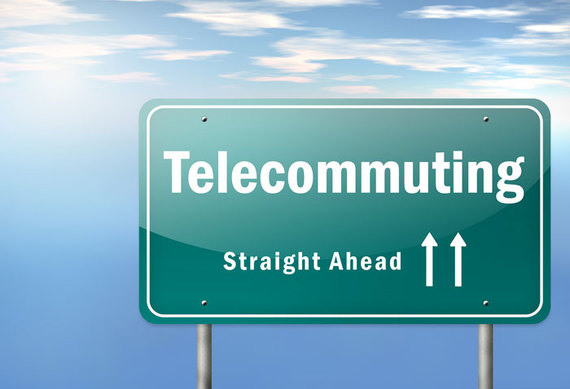Back in 1976, science fiction writer Arthur C. Clark gave an interview at a conference sponsored by the Massachusetts Institute of Technology and talked about his vision for the future. (You may remember that Mr. Clark was the writer of 2001: A Space Odyssey.) During that interview Mr. Clark predicted the development of Google, the iPhone, email, Skype and the Internet as we know it.
Those technological advances predicted by Mr. Clark almost 40 years ago are here today and changing the face of work and where work can be conducted. Many businesses are finding that productivity can be increased with a flexible workforce.
Forward-thinking business owners understand that trends are clearly moving towards embracing flexible work as a way of doing business, rather than doing business the same old way.
Who is Actually Working From Anywhere?
The Census Bureau identifies the typical telecommuter as a 49-year-old college graduate--man or woman--who earns about $58,000 a year and works for a company with more than 100 employees. More companies are planning to offer telecommuting as a benefit than ever before. Why? What are the benefits of working remotely for the individual?
Main Reasons Employees Want Flexible Work
In a recent survey conducted by FlexJobs, the overwhelmingly clear number one reason employees want flexible work options was work-life balance (74 percent). Health and exercise and family reasons came in second (52 percent each). Close runners-up included time savings and reduced commute stress (47 percent) and cost savings (43 percent).
Interestingly, a fair number of employees think they would be more productive working from home. They cite fewer interruptions from co-workers, fewer general distractions and, maybe not too surprisingly, reduction of office politics.
What About Business Owners?
Employees are not the only ones who want flexibility. Entrepreneurs want flexibility in managing their businesses for many of the same reasons workers want it. Fortunately, there are many mobile business solutions to make this a reality. For example, small business software, smart phones, web conferencing and collaboration, and virtual private networks (VPNs) are particularly suited to the busy business owner.
From Telecommuting to Virtual Workplaces
Telecommuting as a trend is well on its way. The next step in the evolution of work will be fully virtual workplaces. There are about 75 fully virtual workplaces in the U.S. today and more are on the horizon. Virtual companies are making a strategic decision to go fully distributed due to the associated advantages (recruiting good talent, work life balance, reduced costs, etc.). Kelli Dragovich, VP of Human Resources at GitHub said, "A distributed workforce allows our employees to better balance the demands of their lives where they are the most comfortable. In turn, it helps us to be a global organization with super talented and creative people, where we can better, and more quickly meet the needs of our users."
Work Can Happen Wherever You Are
According to a recent article in Fast Company "rush hour" is disappearing as people ditch the traditional commute to live and work differently. Co-working spaces are popping up everywhere: one estimate puts the number above 20,000--almost double the number of global co-working spaces since 2008.
Remote Year is a fascinating program that relies entirely on this idea of working from anywhere. Participants in the program commit to traveling as a group for one full year, working one month in each of 12 locations around the globe. Each participant is required to have a job that allows them to work remotely. Remote Year does not provide a job for the participants, but provides workspaces in each of the 12 locations to facilitate the participants' work needs. Travel and work--what a combination.
Work-from-home policies are increasingly standard among employers of all sizes, and remote work is a growing trend--Automattic, the company behind WordPress, is 100% remote, its employees scattered in workspaces everywhere. According to Ross Perlin, "Technology may be the great enabler, but the impulse is deeply human: we want to live life on our terms in the place we are most comfortable, and we can work there, too."
Margaret Jacoby, SPHR, is the founder and president of MJ Management Solutions, a human resources consulting firm that provides small businesses with a wide range of virtual and onsite HR solutions to meet their immediate and long-term needs. From ensuring legal compliance to writing customized employee handbooks to conducting sexual harassment training, businesses depend on our expertise and cost-effective human resources services to help them thrive. This article first appeared on the MJ Management Solutions blog.
